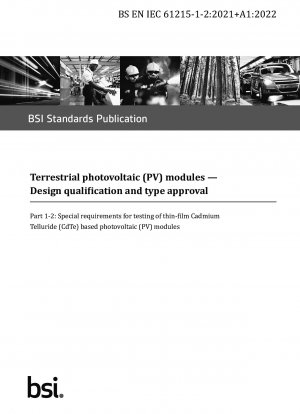BS EN IEC 61215-1-2:2021+A1:2022
Terrestrial photovoltaic (PV) modules. Design qualification and type approval - Special requirements for testing of thin-film Cadmium Telluride (CdTe) based photovoltaic (PV) modules
- Standard No.
- BS EN IEC 61215-1-2:2021+A1:2022
- Release Date
- 2022
- Published By
- British Standards Institution (BSI)
- Latest
- BS EN IEC 61215-1-2:2021+A1:2022
- Scope
- This document lays down requirements for the design qualification of terrestrial photovoltaic modules suitable for long-term operation in open-air climates. The useful service life of modules so qualified will depend on their design, their environment and the conditions under which they are operated. Test results are not construed as a quantitative prediction of module lifetime. In climates where 98th percentile operating temperatures exceed 70 °C, users are recommended to consider testing to higher temperature test conditions as described in are recommended to consider testing designed for PV in consumer electronics, as described in IEC 63163 (under development). Users wishing to gain confidence that the characteristics tested in IEC 61215 appear consistently in a manufactured product may wish to utilize This document is intended to apply to all thin-film CdTe based terrestrial flat plate modules. As such, it addresses special requirements for testing of this technology supplementing This document does not apply to modules used with concentrated sunlight although it may be utilized for low concentrator modules (1 to 3 suns). For low concentration modules, all tests are performed using the irradiance, current, voltage and power levels expected at the design concentration. The object of this test sequence is to determine the electrical characteristics of the module and to show, as far as possible within reasonable constraints of cost and time, that the module is capable of withstanding prolonged exposure outdoors. Accelerated test conditions are empirically based on those necessary to reproduce selected observed field failures and are applied equally across module types. Acceleration factors may vary with product design and thus not all degradation mechanisms may manifest. Further general information on accelerated test methods including definitions of terms may be found in IEC 62506. Some long-term degradation mechanisms can only reasonably be detected via component testing, due to long times required to produce the failure and necessity of stress conditions that are expensive to produce over large areas. Component tests that have reached a sufficient level of maturity to set pass/fail criteria with high confidence are incorporated into the IEC 61215 series via addition to Table 1 in IEC 61215-1. In contrast, the tests procedures described in this series, in IEC 61215-2, are performed on modules. This document defines PV technology dependent modifications to the testing procedures and requirements per IEC 61215-1:2021 and IEC 61215-2:2021.
BS EN IEC 61215-1-2:2021+A1:2022 history
- 2022 BS EN IEC 61215-1-2:2021+A1:2022 Terrestrial photovoltaic (PV) modules. Design qualification and type approval - Special requirements for testing of thin-film Cadmium Telluride (CdTe) based photovoltaic (PV) modules
- 2021 BS EN IEC 61215-1-2:2021 Terrestrial photovoltaic (PV) modules. Design qualification and type approval-Special requirements for testing of thin-film Cadmium Telluride (CdTe) based photovoltaic (PV) modules
